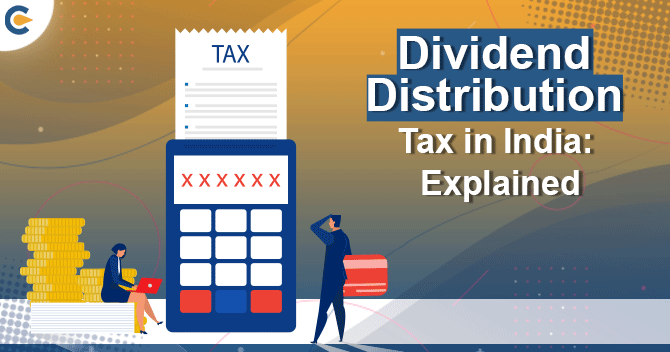A dividend refers to a return provided to the shareholders by the company against the profit generated in a particular year. The dividend is an income that is taxable in nature as per the IT department rules. But, the income tax rules of our country provide for an exemption of the dividend income received from companies by the investor by imposing a tax known as Dividend Distribution Tax on the dividend-paying company. The Section 115O regulates the provisions relating to DDT
What’s new on the Dividend Distribution Tax?
- As per the Income Tax departmen, the local establishment is not required to pay DDT, i.e. dividend distribution tax on any amount declared, distributed, or paid by such establishment via a dividend, w.e.f, Assessment Year 2021-22
- A dividend coming from a domestic establishment is taxable in the hands of shareholders.
Who is liable to pay Dividend Distribution Tax (DDT), and what is the existing rate slab?
Any domestic entity which is paying a dividend is liable to pay dividend distribution tax @ 15 per cent against the gross amount of dividend as per Section 115O. Thus, the applicable rate of dividend distribution tax s approx 17.65 per cent on the dividend’s amount.
As per Section 115O, Dividend Distribution Tax is 15 per cent in case of dividend as mentioned in Section 2 (22)(e) of IT Act, it has been capped at 30 per cent.
Illustration for Understanding the Concept of Dividend Distribution Tax
Let understand the applicability of the Dividend Distribution Tax via example.
Estimate the DDT on the dividend paid of Rs 3,00,000
Step I: Calculate the grossed-up dividend. This is estimated @ 17.65 per cent on Rs 300,000, which would amount to Rs 52,500.
Therefore, the grossed-up dividend shall be equal to Rs 352500
Step 2: Estimate Dividend Distribution Tax on the grossed-up dividend @ 15 per cent, which shall amount to Rs 450000. Thus, the DDT on Rs 300,000 will be 345000. This rate does not take surcharge and cess into consideration; otherwise, the effective rate would increase to 20.56 per cent.
Applicable timeline for paying DDT
DDT is required to be paid within 14 days of the declaration, disbursement of dividend amount whichever is the earliest. The failure of payment in the said timeline would compel the company to pay the interest @ 1 per cent of the DDT. The interest rate in the context would be charged from the date following the date on which said DDT was payable till the period such DDT is paid.
Special Provisions Related to DDT
If the income generated via dividend exceeds Rs 10 lakh, the same shall be taxable @ 10 per cent for individuals, Hindu Undivided Families, private trusts and partnership-based firms.
In the case where the parent company received dividends from its subsidiary entity (both being domestic companies), then when the former distributes dividends, the amount of dividend subjected to DDT shall be equivalent to
Dividend declared/paid/distributed during the financial year -Dividend received by parent company during the FY (exposed to certain conditions)
Dividend Deposit Tax on Mutual Funds
- DDT applicability is not only limited to the above scenario, but it also covers mutual funds under its ambit:
- The DDT on Debt oriented funds is taxed @ 25 per cent (29.12 per cent including surcharge + Cess)
- But, equity-oriented funds are not exposed to DDT. Fund holders holding the investors’ dividend need not pay any taxes in this regard.
Impact on the Investor
Mutual funds that invest less than 65 per cent of the amount in equity are known as non-equity funds such as debt funds for taxation purposes. Investors aiming to earn periodic income via dividends of equity-oriented funds should prefer this strategy. Doing so can help them avoid severe tax cuts on their return. However, the dividend remains non-taxable in the hands of the investors.
The fund house shall make the DDT deduction before any dividend payments. Dividend schemes are not beneficial for long-term capital gains below Rs 100,000 as other schemes form tax.
Who should opt for Dividend Scheme?
Investors aiming for stable income can opt to invest in a dividend scheme, despite the higher tax.
If you intend to create wealth, a dividend scheme might not be your best bet for you as it could undermine your accumulated profits at regular intervals. Besides, the compounding benefit ceases to exist on the payment of dividends. Despite the new tax landscape, equity-oriented funds remain the preferred investment tool due to the high return.
Noteworthy Points about the Dividend Distribution Tax
- Direct distribution tax is payable separately, apart from the income tax liabilities of a company. No deduction or credit is permitted to the entity for the DDT paid.
- DDT would cease to exist in a case where the dividend is paid to any individual on behalf of the New Pension System Trust
- Section 115BBD facilitates a concessional tax rate of 15 per cent on dividends coming from foreign subsidiaries to the Indian company.
- Furthermore, no deduction w.r.t any allowance or expenditure or set-off of loss shall be permitted to the taxpayer in computing the income generated dividends.
Conclusion
A dividend distribution tax should be payable by the eligible shareholder against the slab rates mentioned above. Skipping such a requirement could be a bad idea for shareholders since dividend is a form of taxable income.
Read our Article:Dividend Declaration: Sources, Mandatory Conditions and Procedure











